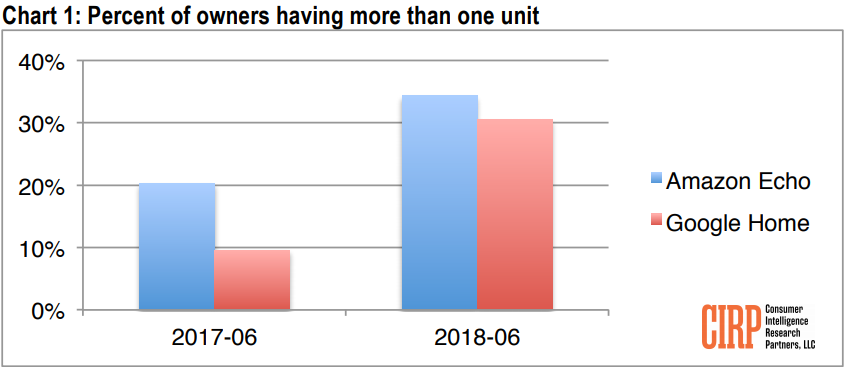Apple Inc. (NASDAQ:AAPL) just cannot seem to get out of the news lately. With all the speculation and buzz coming out of its iPhone wing, the other wings might tend to get a little less of the limelight. The category in question is the smart speaker. Apple began selling its smart speaker, the HomePod, early this year. But as of now, the Apple HomePod holds only 6% share of the US installed base of smart speakers, according to Consumer Intelligence Research Partners, LLC (CIRP).
The report also suggests that the Echo Dot accounts for more than half of the Amazon Echo installed base, while the Home Mini accounts for nearly 40% of the Google Home installed base as of June 2018.
History of Smart Speakers And Companies Involved
The technology of smart speakers is as recent as it can get. It was in 2014 when Amazon.com, Inc. (NASDAQ: AMZN) created that category in tech devices with its product, the Amazon Echo. Back then, many a person was somewhat sceptical to speak to speakers, to say the very least. But soon after, companies like Google and Apple invested a lot of money in the research of this very technology. Google (NASDAQ: GOOGL) came out with its brand of smart speakers, called Google Home, in late 2016. Apple took even more time to come up with a competitor product in this category. Their brand of smart speakers, the HomePod, wasn’t officially bought and received by customers until February of this year.
These aren’t the only players in the smart speaker market either. Other companies are actively looking to enter into this space, whose potential is there for everyone to see. Alibaba has already captured their home market of China with their smart speaker brand, Tmall Genie Speaker. This is quite a feat, considering the fact that the device was introduced as recently as the July of last year.
The Smart Speaker Market
It is expected that the smart speaker installed base will cross the 100-million mark by the end of 2018!
The smart speaker market itself has been increasing in size and volume substantially during recent times. According to Canalys, the global smart speaker shipments reached 16.8 million in Q2 2018, with an increase of whopping 187% YoY. Interestingly, Google retained its top spot with 5.4 million units of Goog Home models shipped in the quarter, followed by 4.1 million units of Amazon Echo devices.
This demonstrates the domination that the two tech giants hold over the smart speaker market. Even companies like Alibaba, which wasn’t even listed in this category until last year, came in third in Q2 2018, with about 3 million shipments of its Tmall Genie smart speakers. So the question begs, where is it going wrong for Apple?
Apple HomePod Market Share vs Others
Apple’s HomePod registered only 6% market share in the US as of June 2018. This implies that the percentage of Apple users buying the HomePod is a meagre 2%. Considering hardcore Apple consumers are the only ones who can fully utilize the HomePod, this is a major concern. But why is this happening in the first place?
There are a variety of reasons why people prefer other smart speaker brands over the HomePod. Apple’s problem in compatibility with devices other than its own limits the functionality of the HomePod to a certain extent. But the major reason behind the preference of Google Home and Amazon Echo over Apple’s HomePod is the pricing.
Apple’s HomePod is priced at around three times that of Google Home and Amazon Echo, despite arguably providing lesser features. Therefore, naturally, consumers move on to other cheaper alternatives. This gives even more testament to the way Google and Amazon have captured this market, with Google leading the way in terms of shipments as of now.
In fact, Amazon and Google have not only sold more smart speakers than Apple in the first half of 2018, but they have also encouraged individual consumers to own more than one unit. More than 30% of the Amazon Echo and Google Home users now own more than one unit.


